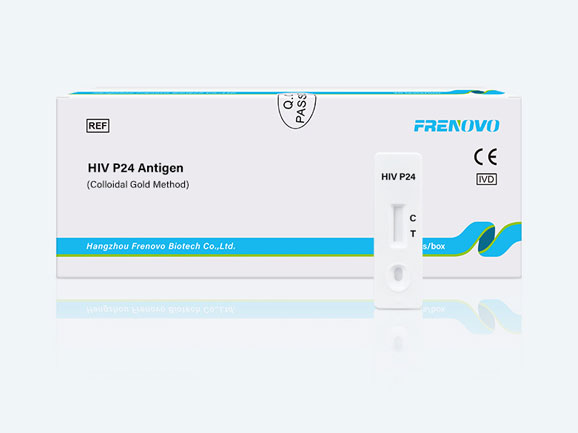HIV P24 Antigen Rapid Test

Mô tả sản phẩm
An anti-HIV p24 monoclonal coating antibody is adsorbed onto a microtiter plate. p24 antigen present in the sample or standard binds to the antibodies adsorbed on the plate; a FITC-conjugated mouse antip24 antibody is added and binds to the p24 antigen captured by the first antibody. Following incubation and wash steps, an HRP-conjugated mouse anti-FITC antibody is added and binds to the FITC conjugated anti-p24. Following unbound HRP-conjugated mouse anti-FITC antibody is removed during a wash step, and substrate solution reactive with HRP is added to the wells. A colored product is formed in proportion to the amount of p24 antigen present in the sample. The reaction is terminated by the addition of acid and absorbance is measured at 450 nm. A standard curve is prepared from recombinant HIV-1 p24 protein and sample p24 concentration is then determined.
Come and get p24 test price
Introduction of HIV P24 Antigen Rapid Test
Approximately 1.5 million infants are born to HIVinfected women each year,1 majority of whom are not tested for HIV until it is too late for optimal antiretroviral therapy (ART). Without treatment, the mortality rate in HIV-infected infants can be as high as 45% by the first birthday and 59% by the second.2 Recent studies have demonstrated that early HIV diagnosis and prompt ART intervention can reduce infant mortality by 76% and HIV progression by 75%.3 Such studies have contributed to a change in treatment guidelines by the World Health Organization to initiate ART therapy in infants as soon as they are diagnosed with HIV.
Discussion of p24 antigen test kit
PCR and enzyme-linked immunosorbent assay–based assays currently used for the detection of acute HIV-1 infection in infants do not provide cost-effective results in most resource-limited settings. They must be run in centralized laboratories where reliable electricity, refrigeration, and trained clinicians are available. Samples originating from all parts of a country thus have to be transported refrigerated or as dry blood spots to the few centralized laboratories to perform testing. Because of this impediment, the time between blood draw and the report of results to the patient can be as long as 3 months.15 Furthermore, our own studies suggest that the operational sensitivity (ie, percentage of positive results reported to patients) of dry blood spots DNA PCR may be as low as 50% due to sample loss or loss of the patient to follow-up.16,17 A point-of-care assay would eliminate these problems as the assay would be conducted at the sample collection site, and the results conveniently provided within the same patient visit.
Result of HIV P24 Antigen Rapid Test
The analytical sensitivity of the dipstick p24 antigen assay coupled with heat shock pretreatment was determined to be 50 pg/mL (2 pM) in a matrix of recombinant p24 antigen spiked into normal plasma. The diagnostic performance of the p24 antigen assay was evaluated with 51 archived infant samples obtained from the US WITS study. In these samples from infants aged younger than 18 months, the assay performed with a sensitivity of 89.5% and specificity of 100%. These promising results indicated that we could achieve similar if not better performance with fresh infant samples in a clinical setting from African patients. To this end, further diagnostic evaluation with the dipstick assay yielded comparable performance when 24 HIV-positive and 365 HIV-negative samples were tested from HIV-exposed infants younger than 1 year of age. Sensitivity was determined at 95.8% and specificity at 99.4% in this population.
Or you may be interested in roller assembly machine and rapid test dispenser.

